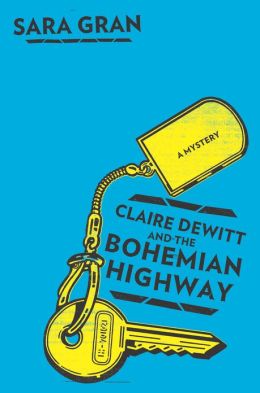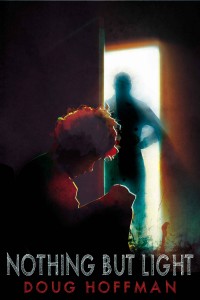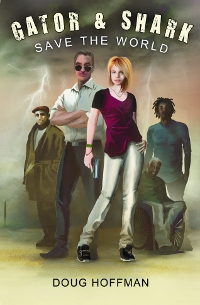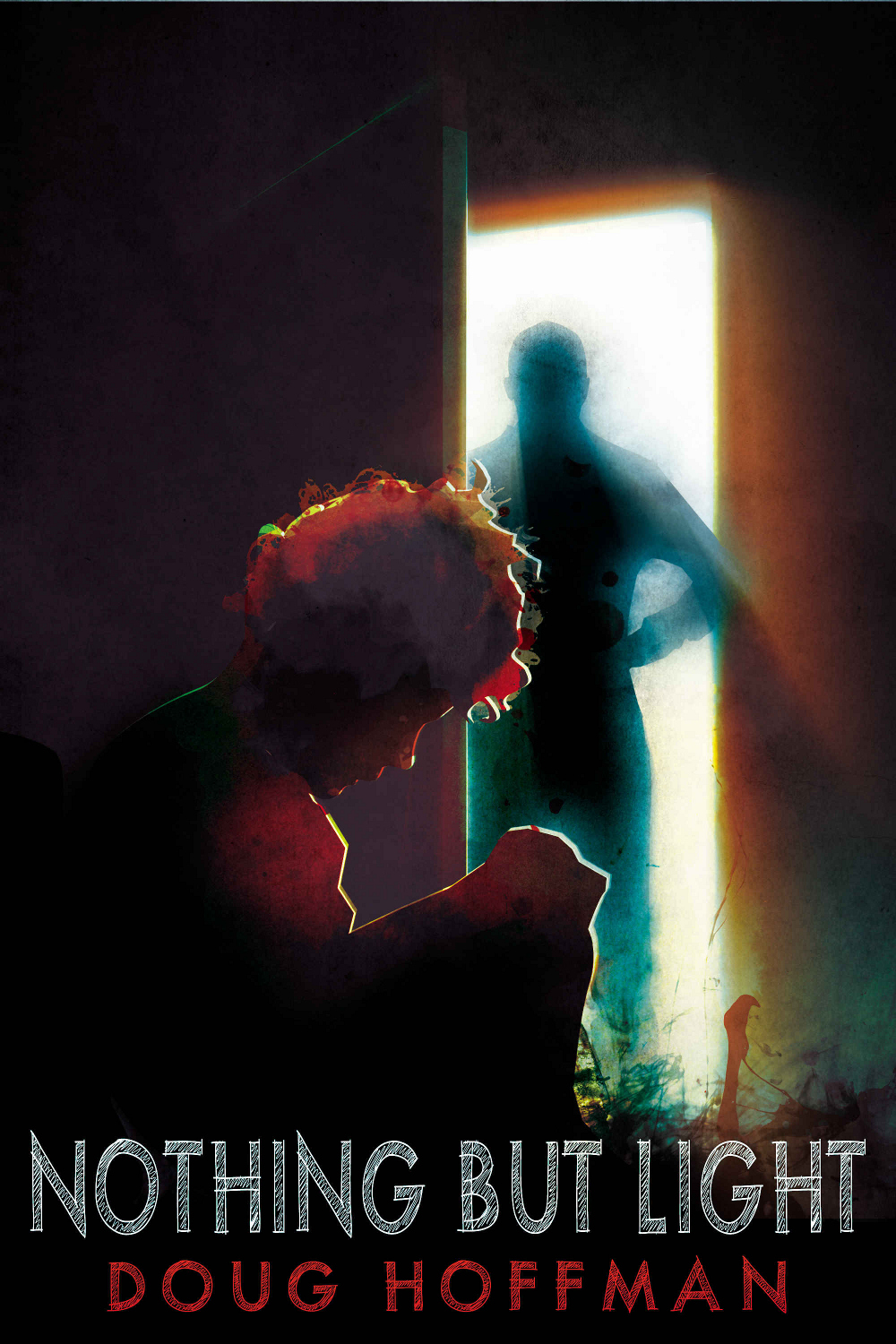Balls and Walnuts
more than you ever wanted to know
Category Archives: Books ‘n’ Authors
Hey! Look! A contest!
You can win a signed, hard cover edition of Sara Gran’s Claire DeWitt and the Bohemian Highway
(see my review here) by helping me promote either my free ebook at Smashwords
or my Kindle book,
Here are the rules:
1. Multiple “entries” possible. Each entry will function as a lottery ticket, and I will decide the winner based on a drawing of such tickets. I have only one copy of Sara’s book, so there will be only one winner.
2. Each of the below will count as one entry:
a) Shout out this contest on twitter, facebook, or your blog. Your shout must include the URL for this blog post. If you do so on twitter, facebook, and your blog, that will count as three entries.
b) If you’ve read Gator & Shark, leave a review on Amazon or Goodreads. (If you do both, that will count as two entries.)
c) If you’ve read Nothing But Light, leave a review on Smashwords or Goodreads. (Ditto.)
3. Contest will end when interest dies down — probably next Monday evening.
4. Important: to get credit, you must indicate in the comments below what you have done.
Any questions?
D.
hey, it’s FREE!
Nothing But Light, my short story collection, available free at Smashwords:
And here’s the mini-blurb:
A reality-bending toy becomes the next Rubik’s Cube, a grandfather’s stroke pushes him way outside the time stream, and two misfits find inspiration for revenge: these and more off-kilter stories await you in Doug Hoffman’s Nothing But Light.
Did I mention that it’s free?
D.
I have a page on Amazon. You know what to do.
Here’s the Amazon link for Gator & Shark Save the World.
Here’s the Facebook post, modified to suit the blogging arena . . .
***
So many reasons to buy my book:
1. I don’t publish crap. Ever. If you don’t believe me, Amazon has posted the first three chapters for you to sample.
2. I’m a first-time author. Somewhere in the Bible, “supporting first-time authors” is a major mitzvah. (Shouting this out on your blog? That’s a mitzvah, too, as is leaving glowing reviews at Amazon. The ancient Israelites were all about leaving glowing reviews at Amazon. The Ten Commandments God gave to Moses? 4.7 stars — a few Philistines voted.) And if you’re an atheist, well, atheists are into good deeds, too, right?
3. Guaranteed to make wingnut heads explode!
4. Low, low price of $3.99. Face it, you spend more than that whenever you go to Starbucks, and my book won’t turn into pee two hours after you buy it.
5. Best of all, the story and characters are ripping good.
If the price is a problem, I will be hosting a few free days. To be announced.
D.
The books we don’t read
I dreamed last night that I heard a big van pull up outside my house, and something heavy hit the ground. Went outside and found a huge shipment from Amazon — hundreds of paperbacks delivered to me on two large wooden thingies (damn, what are they called, those squarish wooden platforms that heavy stuff sits on?) All of ’em, authors whose names I didn’t recognize. A la Roy Scheider, I thought, “We’re gonna need a bigger bookshelf.” Didn’t give one second’s thought to how I’d find the time to read them.
I’ve been bad about this for some time now. A quick perusal of my library reveals I’m especially lazy in reading short story collections and nonfiction. It’s rare for me to leave long fiction unread, although Michael Moorcock’s Elric series lies dormant (never really grabbed me), and I never quite finished Vance’s Tales of the Dying Earth. But short story collections? I have Gogol, Chekhov, Maugham (to name three off the top of my head). Maureen McHugh’s Mothers and Other Monsters, from which I enjoyed the first story, but never managed to reopen. Library of America collections from Carson McCullers, Flannery O’Connor, and Dashiell Hammett. And in nonfiction, I could go on and on . . . numerous popular science books, Sara Benincasa’s memoir, T. E. Lawrence’s Seven Pillars of Wisdom (which exists unread in my library, as well as on my Nook).
I regard this as a form of shopaholism. See it, want it, buy it. A very mild form of the disease, given that my birthday prezzy Barnes and Noble gift certificate (from my sister) still lies unused . . .
D.
The joys of research
So . . . if I find myself learning about onion routing one day and teat dips the next, it has to be an interesting book, right? Or at least an eclectic one.
My writing has also led me to the yaksha (if any of my readers are reading this, do NOT follow the link on yaksha) and a Sanskrit poem called The Cloud-Messenger. Not sure how much of that will filter in to the end product. Some seeds never sprout. I’ve placed a whopping huge reference to Howard Zinn’s A People’s History of the United States early in the novel, but I may ultimately have to swap out for another book, or perhaps nix that scene entirely.
Now I’m off to read more about goat milking, wind turbines, and Arcadia — not the city-of-my-childhood Arcadia, but the pastoral Eden Arcadia.
But first, I’m going to do a bit of writing.
D.
Multibook mode
For some reason, I get this way sometimes: I prefer to be reading multiple books at once (well, not EXACTLY at once), dipping into each one as the mood hits me. This morning, I realized that the number has piled up:
1. The first Skulduggery Pleasant book, a YA magical-sorcery-thingy which Lyvvie recommended as an example of someone who writes 12-year-olds well. Her daughter loves the stuff. And while I can see the attraction to a pre-teenaged girl (the heroine is strong, intelligent, and brave), there isn’t much meat here for the adult reader of YA. My vote is still for the Bartimaeus Trilogy, which admittedly is aimed at an older YA crowd, but has enough humor and depth to appeal to the adult reader. And while the protagonist is male, one of the main characters is, you guessed it, a strong, intelligent, and brave young woman.
2. Still working my way through China Mieville’s The Scar. This is one of his earlier works, and I tend to like his more recent novels better. The Scar is just on the cusp of eh, think I’ll put this one down for now. But I’m 3/4 of the way through and haven’t given up yet. There simply isn’t enough there: not enough action, not enough appeal to the characters or plot, not enough of Mieville’s signature weirdness. All it has going for it is a bit of narrative drive. I want to know what happens next.
3. I’m rereading Crime and Punishment . . . again, as the mood hits. I read it between 9th and 10th grade, I think, and wanted to revisit it as an adult. I may not finish it; every time I pick it up, I want to slap Raskolnikov upside the head. He’s a very Hamlet-like character in the way he dithers, and I’ve never much liked Hamlet.
4. When I have nothing to read but Nook on my cellphone, I turn to James Ellroy’s The Cold Six Thousand, a novel about the two Kennedy assassinations and the MLK assassination. Lots of dish on J. Edgar Hoover, Jimmy Hoffa, various mobsters, etc. Who cares if it’s fiction; it reads like a dramatization of true events. And who doesn’t want confirmation that the JFK assassination was a fix from the highest powers? (Yup, God wanted JFK dead.) (Kidding, kidding!) I’m reading this mostly because I find Ellroy’s style so fascinating: staccato, brutally stark. Ellroy himself described the style as “ugly.” Plus, it’s fascinating how well he evokes the early 60s.
5. And when I have to have an actual paperback in my hands, I’m reading/rereading Tim Powers’s time travel novel, The Anubis Gates. First time I tried reading this many years ago, I bogged down at around page 120. The time travel gimmicks struck me as just a wee bit too coy and obvious. Now I’m at page 265 and I’m finally hooked. I enjoyed it more this time around (the first half, that is), and in retrospect I think I abandoned it for a number of reasons. Powers suffers from the too-much-research problem (. . . and I have to share all of it with you) and yet he occasionally screws up, as when one of the minor characters in the 1600s calls sausages ‘sawfages.’ Just because typesetters used that f-thingy for internal s’s doesn’t mean people PRONOUNCED it that way. Jeez. Anyway, I’m skimming through all of the dense descriptive bits and having a much better go of it.
So what are y’all reading?
D.
Noise, and the nearly nonexistent lefty survivalist
 About a week ago, I finished Darin Bradley’s Noise, a novel about college students responding to — and some would say helping to precipitate — TEOTWAWKI (the end of the world as we know it, an acronym common on survivalist web sites, along with WTSHTF: when the shit hits the fan). In some ways, Noise is an infuriating novel. Bradley wrote it following the completion of his PhD in English literature and theory, and it shows. He writes in the postscript, “So I had a head full of cognitive theory and nineteenth-century American utopianism, and I had loads of free time.” The novel often reads as though Bradley had just finished Cormac McCarthy’s The Road and said, “Hmm, you know what? Not lyrical enough.”
About a week ago, I finished Darin Bradley’s Noise, a novel about college students responding to — and some would say helping to precipitate — TEOTWAWKI (the end of the world as we know it, an acronym common on survivalist web sites, along with WTSHTF: when the shit hits the fan). In some ways, Noise is an infuriating novel. Bradley wrote it following the completion of his PhD in English literature and theory, and it shows. He writes in the postscript, “So I had a head full of cognitive theory and nineteenth-century American utopianism, and I had loads of free time.” The novel often reads as though Bradley had just finished Cormac McCarthy’s The Road and said, “Hmm, you know what? Not lyrical enough.”
That said, I loved Noise and recommend it without any other reservation. Alternating chapters relate the first person narrative of “Hiram” (who, with his college roommate “Levi” have adopted new names to fit their new identities in the post-WTSHTF world) and The Book, a cobbled-together guide to surviving TEOTWAWKI. The details of TEOTWAWKI — referred to in Noise as “the Collapse” — are sparse, but Bradley suggests an economic bust so profound that governments and law enforcement fragment, its individual subunits going rogue in a last-ditch effort to survive. Hiram’s chapters detail his and Levi’s efforts to “get the jump” (predict the Collapse so as to get a head start on last minute preparations), put together a Group, bug out of their college town of Slade, Texas, and make it to their Place, which they have called Amaranth. The Book chapters would make a fascinating read all by themselves, as they provide a manual for how to survive and ultimately thrive in the most ruthless of new (post-apocalyptic) worlds.
Hiram is little more than a boy. The memories he draws upon to ground himself in this new world are of his days in the Scouts and his all-nighters playing Dungeons and Dragons. Bradley masterfully orchestrates the interplay between Hiram’s memories, the dictates of the Book (theory), and the things he must now do (practice). To commit sometimes horrific acts of violence, he and the rest of his Group have adopted new names, wear face paint or masks, carry out their actions in a somewhat ritualistic manner, and afterwards reassure one another with, “What you did was right.” That last essential closer is what in my opinion makes this a truly haunting work, for it is the acceptance of the perpetrator’s new society, his Group, which makes maiming and murder not just socially acceptable but laudable to them.
This book has stayed with me. I won’t spoil the ending here, but I will say that the closing image was predictable yet still remarkably powerful.
And this book has played into some of my own fears and anxieties about the world and the shit we’re getting ourselves into. I’ve been beefing up our somewhat meager emergency kits, trying to think both of the relatively trivial emergencies like breaking down on a drive over the Grapevine in the middle of winter, and the big ones, TEOTWAWKIs. In the course of doing my internet searches, it soon became apparent that survivalist types are largely right-wing and, well, religious. And that led to what I had thought at first was an innocent question, but has turned more interesting than I’d first thought:
Are there any liberal, lefty, left-wing survivalists, or are they all rifle-toting God-loving Obama-hating rednecks?
viscera
This afternoon, I heard a piece on NPR about the giant African snail, which is an invasive species in South Florida. Look at these monsters:
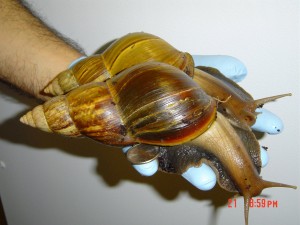
They’ll eat any and all vegetation. They’ll even eat the stucco off a house. They are incredibly difficult to eradicate, and they carry an organism that can cause meningitis in humans (which is why the dude in the photo is wearing gloves, I’m guessing). On the other hand, they might prove to be part of the solution for protein malnutrition in Africa. Which I am totally okay with. I would eat that snail pie. I’ll take a pass on the locusts, though.
***
We’ve been having trouble with our Miata’s AC. Dean, I’m talking to you here, since you’re a Miata owner and a car guy (i.e., you can change your oil without getting a panic attack like some of us). Here’s the deal: the AC cut out while Karen was idling the car, waiting for Jake to get out of school. Took it into the shop and the mechanic said the compressor was shot. He replaced the compressor (and showed us the old one — there was some kind of thoroughly rotten gasket thingie in there). Next time we drove it in hot weather, it was evident that the AC was underpowered. I took it back, and he flushed the system or some damn thing. After that it worked great in cool weather and hot weather, and stayed good for almost a week. Then, last Thursday, it cut out again while Karen was idling for all of about 15 minutes.
I took it in today and asked the mechanic to let it idle for 15 minutes. He let it idle for 45 minutes, he says*, and everything was fine. And I drove it away from his place and it stayed fine. I asked him what would make it cut out like that and he didn’t know.
Maybe this is one for the Car Talk guys.
***
Still writing here and there. It was a busy week so I didn’t get a chance to work until today. Gonna get back to it momentarily. I keep feeling torn between “trite” and “great.” “Great” because I enjoy rereading it, “trite” because, well, it’s a commercially sound story, i.e. the kind of thing that would likely sell. I’m almost feeling guilty that it’s not weird enough.
***
Finished Sara Gran’s Claire DeWitt and the City of the Dead. And, wow. This author’s writing is up there with Jonathan Lethem, Michael Chabon, Martin Cruz Smith . . . I was very impressed with this novel, and I’ve liked her other novels, too (Dope and Come Closer were great; I haven’t read Saturn’s Return to New York).
I’ve also been dipping into Jeff Huber’s Bathtub Admirals which is quite good (and reading a not-yet-published book by a certain author who frequents this blog!) The blurbs on Huber’s book compare it to Catch-22, but so far I am liking it a whole lot better than Catch-22, which I have never been able to finish, despite trying multiple times.
***
Okay, stop procrastinating.
D.
*I dunno — shouldn’t the gas gauge drop at least an eighth of a tank if he really let it idle for that long? Maybe I need to run this test myself.
